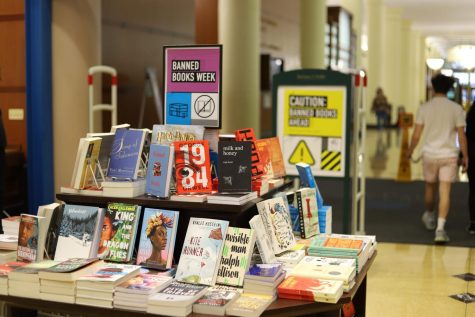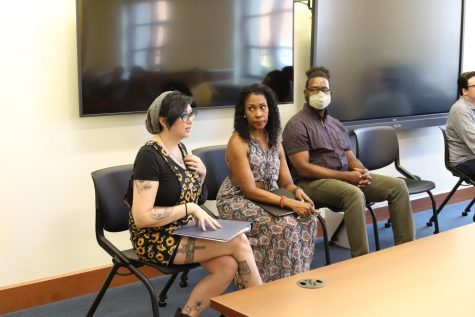Books behind bars
September 25, 2022
Censorship of books has been debated at record high amounts from Facebook groups to local government forums. Forty years after the beginning of Banned Books Week, The American Library Association (ALA) found that 1,597 books were banned in 2021, the highest annual amount to date. Sept. 18 through 24 marked Banned Books Week which started for the purpose of drawing attention to the harms of censorship, according to ALA. The first amendment and censorship have been debated together in these forums and groups.
“All over the country people routinely challenge the existence or availability of books that they do not like,” DePaul adjunct instructor Michael Raleigh said. “Usually when people challenge a book, they are not challenging it just for their own sake, they want to make it unavailable for other people.”
PEN America, a nonprofit organization working to defend free expression, has documented challenges on books in 32 states with Texas and Florida having the most books that are more likely to be censored.
“Why is it threatening?” said Michelle Mirando, professor and chair of the English department.

Reasons for book banning ranges from content to author and location.
“What could possibly be threatening about how LGBTQ folks exist, or that our country is founded on a system of slavery that enabled economic development. I don’t understand,” Mirando said.
“Gender Queer” by Maia Kobabe was the number one top-banned book of 2021. “Gender Queer”, a graphic novel memoir that explores gender identity and sexuality, was banned due to the LGBTQIA+ content and was considered to have sexually explicit images.
“One thing that has happened in the last 20 or 30 years, is publishers feel free to publish books that they were not comfortable publishing more particularly about sexuality,” Raleigh said. “So in a short period of time, we have a lot of books about non-binary sexuality, and sexual freedom. People who are still troubled by that really object to these books.”
According to PEN America, 22% of banned books contain sexual content, including stories of sexual assault and abortion, as well as informational books about sex and puberty.
“There is this push to stop giving everyone rights. And that parents should have a right to dictate what their kids are learning,” Mirando said.

No Left Turn in Education is a national political group fighting to ban books on a state level. One of their goals include: “Support parents in their action in their local schools in eliminating all school learning and activities intended to politicize and indoctrinate students.” No Left Turn In Education is one of many groups that are fighting to ban books by supporting parents in local schools.
“To put the toothpaste back in the tube in terms of things like LGTBQ awareness and Black Lives Matter,” Marando said.
On Wednesday, Sept. 21, DePaul’s library hosted City Lit Theater for “Books on the Chopping Block,” a performance of selections from some of the most popular banned books of 2021.
Selected book titles included readings from the ALA, top ten most challenged books such as “The Absolutely True Diary of a Part-Time Indian” by Sherman Alexie, and “The Hate U Give” by Angie Thomas. The performance was followed by a Q&A session led by the CityLit’s actors.
“[CityLit] have been doing this for 17 years,” performer Noreen McGrath said. “We partner with a bunch of different libraries around the area. With the pandemic, we have been doing a lot more digital productions.”
CityLit performed at several local libraries around Chicago during Banned Books Week and videos of their performances can be found on their website.

At least 50 groups involved in pushing for book bans have played an instrumental role in banning at least half of the books around the country in the 2021-2022 school year, according to PEN America. Of these 50 groups, a number are identified as different religious, conservative political groups. Many include local Facebook parent groups that take action at a local, state and national level.
“They are coming from organized groups that are intentionally targeting books,” DePaul Librarian Jill King said. “It kind of mirrors the polarization of politics in this country.”
Individuals can advocate against book banning by staying informed, speaking out, writing letters to the editor, organizing a Banned Books Week program, and helping spread the word, according to ALA.
“Probably one of the most important things we can do is vote,” King said. “Educate ourselves about the candidates, especially in local elections. Vote for candidates that are going to make the decisions that we want to see.”

Trish / Sep 26, 2022 at 11:44 am
Thank you for this important topic
And for shining a much needed light on this issue.